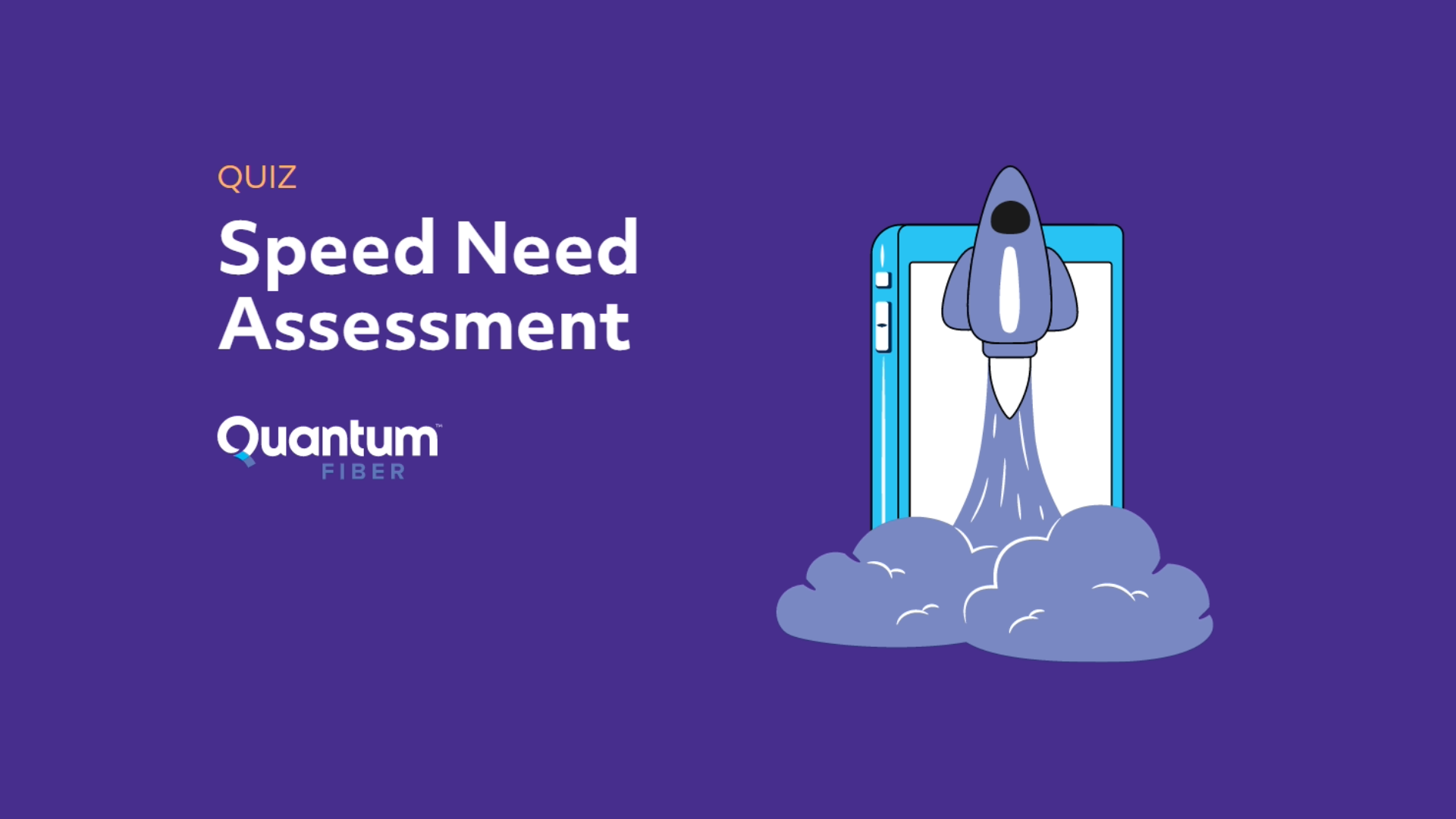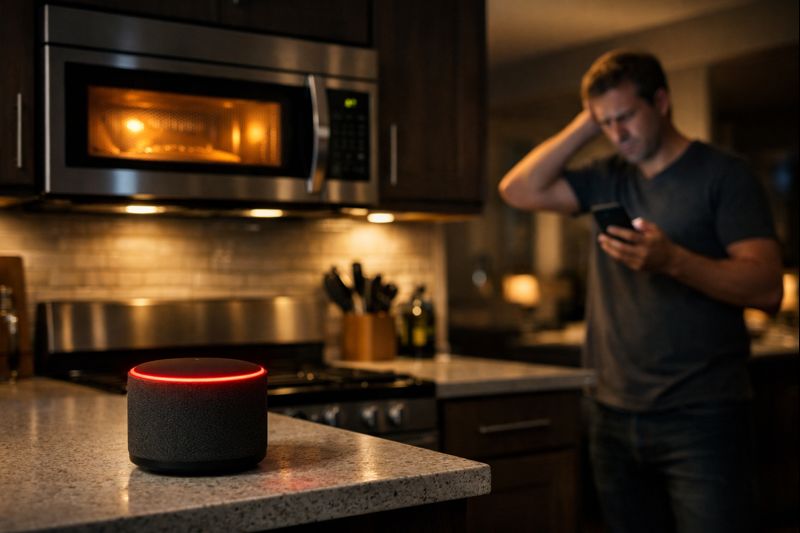We want everything fast—including our internet. We rely on it for work, play, and to stay informed and connected. As technology progresses, we’ll need more reliable, faster internet to keep pace with our busy lives. Plenty of internet speed tests tell you how much speed you’re getting—but how much internet speed do you need? Our handy speed calculator can help you answer this based on your habits and usage.
What internet speeds do you need? Use our calculator to find out.
There are questions you need to ask yourself to make an informed decision about what internet speed you need. Once you’ve calculated your speed requirements, consider boosting that number to account for potential new users and devices down the road.
How many people are connecting to your internet?
Include anyone who uses your connection regularly, not only those living in your household, such as visiting friends and overnight guests. Log in to your router and check your WiFi history of connected devices to manage who can access your connection.
How many devices do you have?
To determine how many connected devices you have, start with your most-used devices, such as smartphones, tablets, game consoles, and computers. Next, do a run-through of other devices in your home. Many household devices now have internet-enabled smart features thanks to the Internet of Things (IoT). These devices may include dehumidifiers, bathroom scales, smart lighting, and security cameras.
How many hours per day is your household connection active?
It can be easy to underestimate this figure. Suppose two people are watching different streaming TV shows simultaneously. In that case, you should count these hours separately. Combination activities like live streaming a multiplayer video game should get counted twice (once as online gaming and once as video streaming). In a multi-person household with streamers, gamers, and remote workers, this number can exceed 24 hours a day.
Why does internet speed matter?
Specific activities require different minimum speeds to be effective. For example, sending a simple, text-only email doesn’t require a fast connection. Streaming a TV show requires higher download speeds. And if you work from home, sending and receiving large files or conducting high-definition video calls require higher download and upload speeds. Determining what is a good download speed is depends on the specific task you’re performing. That same rule also applies to upload speeds.
In simple terms, your internet speed determines how you can use your connection and how many people can connect simultaneously without slowdowns. If your internet connection barely meets the speed needs of streaming TV, you can watch your show. However, if someone in the other room is gaming or on a video conference for work, you may experience a lagged or lost connection.
As more of us work from home, enjoy entertainment from the comfort of home, and integrate more smart devices into our daily lives, faster connections are essential. Learn more about gig speed and how it can help you future-proof your connection.
How to test your internet speed
Assessing your internet habits and usage should give you an idea of what your internet speed should be—but are you getting that speed? Even if you’ve signed up for a plan with advertised speeds higher than you need, you may not always get those maximum speeds. That’s where an internet speed test comes in.
Many websites provide free speed tests. These tests typically establish a connection with a local server and measure how much data can be downloaded or uploaded in a fixed amount of time. Using that information, the test calculates the effective connection speed.
The results indicate your download and upload speeds and ping/latency. These parameters clearly show what your connection is capable of and whether it can meet your needs. Specific terms you’ll see in your internet speed test include:
- Mbps vs. Gbps: These two units measure the rate of data transfer. 1 Gbps (gigabits per second) is 1000X faster than 1 Mbps (megabits per second). Speeds measured in Mbps are more common, but modern technologies like fiber optic internet achieve speeds measured in Gbps.
- Download vs. upload speeds: Download speeds refer to how fast you can receive information (such as loading a web page), and upload speeds refer to how quickly you can send data (like posting on social media).
- Latency vs. bandwidth: Latency is how long it takes for information to make a round-trip journey from your device to an external server. Bandwidth refers to how much data your connection can process.
Learn more about how to read your internet speed test results and what is a good speed test result.
What affects internet speed?
The speeds you’ll find depend on various factors. Some of the most common types include:
- Plan: The speeds and type of service you sign up for will determine your home’s maximum connection speeds. Consider a plan with symmetrical speeds if you work from home or post a lot of content to social media.
- Hardware: If your equipment is outdated, your internet connection may not be able to reach its maximum speed potential. Explore the latest WiFi standards.
- Connection type: Connections that use an Ethernet cable are generally faster than WiFi connections. Although new equipment currently in development may close this gap, you should expect to see somewhat slower speed results when using WiFi than via a hardwired connection.
- WiFi signal strength: Speeds will vary depending on your WiFi signal strength at your device’s location. Discover how a mesh network can help you achieve more robust signal strength.
Learn more about factors that affect your connection and how to increase your internet speed.
What is your speed test result really telling you?
Knowing the ins and outs of a good internet speed can help you understand your results. What matters is, can you do what you need to? The Federal Communications Commission (FCC) defines three categories of users (light, moderate, and high) based on how many high-demand applications you use. Those categories correspond to three levels of internet speed service:
- Basic (3-8 Mbps): This speed is appropriate for those who only use low-demand applications on one or two devices or a single high-demand application (such as streaming video and video conferencing) on a single device.
- Medium (12-25 Mbps): This is the minimum speed for a “light use” household with three to four devices or moderate use household with two or three devices.
- Advanced (more than 25 Mbps): This is the minimum speed for most households.
Consider that the average American household has 11 connected devices. A speed of 25 Mbps is the bare minimum for the average home—and may not be sufficient depending on how you use your devices.
As higher-demand technologies like virtual reality (VR) and 4K streaming become commonplace, the required minimum will increase. For instance, 4K video alone requires 25 Mbps, and high-definition VR requires 100 Mbps for optimum performance.
You may benefit from a faster service if you have adequate speeds under 25 Mbps. Heavy users and larger households should consider a “bare minimum” of 50-100 Mbps.
How much internet speed do you need?
Determining how much internet speed you need is based on various factors, such as your lifestyle, work arrangements, family and living structure, and entertainment preferences. But don’t just think about your current lifestyle and devices.
Suppose you’re planning to start a family. Consider the impact a video-enabled baby monitor will have on your internet speeds. Turning the basement into a rec room with a 4K TV? You’re going to need more streaming bandwidth to make use of 4K resolution.
Still trying to figure out what you need? Check our knowledge base for more information on internet speeds, fiber connections, and other helpful tips so you can confidently decide.
The emergence of multi-gig speed
Some areas served by Quantum Fiber can now access as high as up to 8 Gbps. That’s 40 times faster than the average US download speed*. Even at 1 Gbps, you can connect a virtually unlimited number of devices without experiencing slowdowns, while downloading and uploading large files in seconds.
*Based on the weighted average advertised U.S. data connection download speed of participating Internet Service Providers of 193.9 Mbps. FCC Measuring Fixed Broadband Eleventh Report, December 2021.
Quantum Fiber multi-gig speed does require updated hardware. Rather than a modem, you’ll use a fiber network terminal called the C6500XK (also called the SmartNID). When you choose a multi-gig plan, a technician will install the device and set up your 360 WiFi network..
Fiber internet speeds things up
High-speed fiber optic internet can satisfy your need for speed. Fiber offers an incredibly fast connection capable of reaching speeds over 1 Gbps. That’s enough bandwidth for the whole family to work, play, study, and stream simultaneously without buffering or lost connections. And fiber speeds are symmetrical, so you can create and contribute as fast as you stream and surf.
Learn more about how Quantum Fiber can help you keep pace with the future.
Content Disclaimer – All content is for informational purposes only, may require user’s additional research, and is provided “as is” without any warranty, condition of any kind (express or implied), or guarantee of outcome or results. Use of this content is at user’s own risk. All third-party company and product or service names referenced in this article are for identification purposes only and do not imply endorsement or affiliation with Quantum Fiber. If Quantum Fiber products and offerings are referenced in the content, they are accurate as of the date of issue. Quantum Fiber services are not available everywhere. Quantum Fiber service usually means 100% fiber-optic network to your location but, in limited circumstances, Quantum Fiber may need to deploy alternative technologies coupled with a non-fiber connection from a certain point (usually the curb) to your location in order to provide the advertised download speeds. ©2026 Q Fiber, LLC. All Rights Reserved. Quantum, Quantum Fiber and Quantum Fiber Internet are trademarks of Quantum Wireless LLC and used under license to Q Fiber, LLC.








